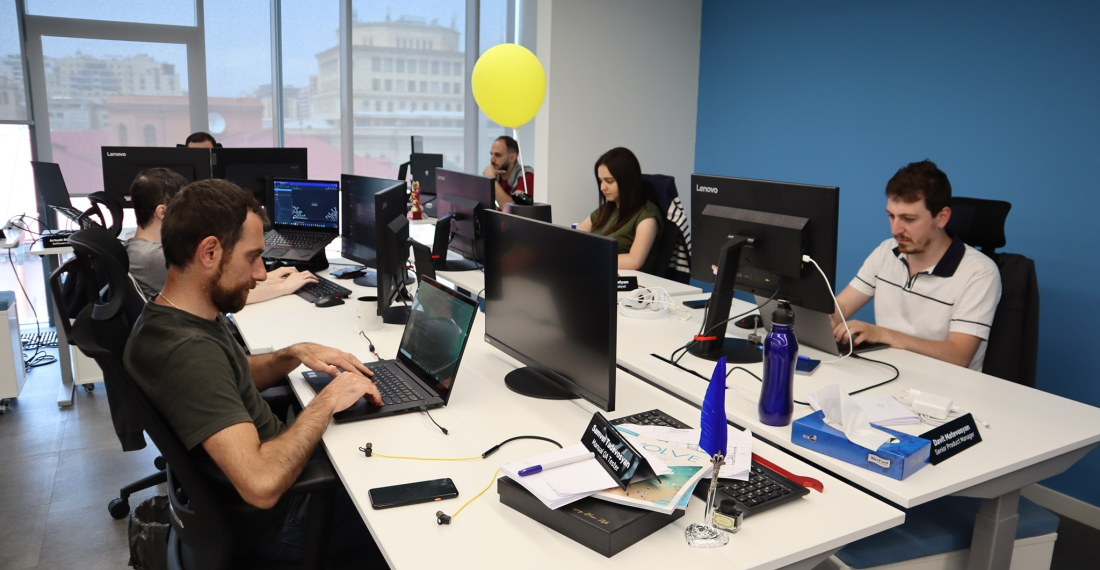In Armenia tech education starts early. In a typical three-storey state school in the suburbs of Yerevan, the Armenian capital, nine-year old Slavik is demonstrating his invention, a box with three LED lights. Next to him, 14-year-old Eric and Narek are showing their smart greenhouse model that monitors temperature and controls fans automatically through a mobile app. Other children are enthusiastically showcasing their inventions: games, robots, apps and smart home projects. Eleven-year-old Arakel is holding his cardboard model of a house with a retractable clothesline.
These young inventors have been attending engineering lab classes where they learn programming, robotics, coding, 3D modelling and more. The programme started in 2014, and is called Armath, which translates into English as "root". Today there are 650 Armath labs in schools across Armenia.
The initiative was established by a business organisation called the Union of Advanced Technology Enterprises (UATE), which represents more than 200 high-tech Armenian companies. "The vision is that we want to see Armenia becoming a tech centre powerhouse that delivers utmost values to Armenia and to the world," says Sarkis Karapetyan, the chief executive of UATE. In his spacious, open-plan office in Yerevan he says that there are now around 4,000 tech companies in Armenia.
Armath is part of the UATE's education and workforce development programme. Mr Karapetyan says the programme is the most successful public-private partnership in the country. "We raise capital expenditure from the private sector, we go to the schools and establish Armath labs, we donate the equipment," he says. "And the government, the education ministry gives us a budget of $2m (£1.5m) annually to pay the salaries of the coaches. There are now more than 600 coaches, and 17,000 active students. "The goal is to have 5,000 of the most talented kids decide to become engineers every year," says Mr Karapetyan.
Unlike its neighbours, Armenia does not have natural resources or access to the sea. But throughout the Soviet era it had been a centre of mathematics and computer science. In 1956 the Yerevan Scientific Research Institute of Mathematical Machines was established in Armenia and by 1960 it had developed two first generation computers. Today, the country is tapping into its legacy with the ambition to transform itself into the tech powerhouse of the Caucasus.
An annual report says that Armenia is the best country in the Caucuses region in which to launch a company, putting it in 57th place globally. This compares with Georgia in 70th position, and Azerbaijan in 80th. A critical factor in boosting Armenia's tech development is the nation's global diaspora, some 75% of the world's estimated Armenians, and people of Armenian descent, live elsewhere. This worldwide community provides important connections, especially in the US tech industry. In the US there are as many as 1.6 million people of Armenian ancestry, centred on California.
Samvel Khachikyan, is director of programs at SmartGate, a venture capital firm based in both California and Armenia that focuses on tech investments. He says that if you look at the top 500 companies in the US, "for sure you'll find at least one or two Armenians" in the boardroom or one management level below. SmartGate takes Armenian founders to Silicon Valley and Los Angeles for intensive networking with top US companies and investors.
Armenia's tech ecosystem received an unexpected boost in 2022 following Russia's invasion of Ukraine. Thousands of Russian IT specialists left their country, and many chose to settle in Armenia. Meanwhile, US chipmaking giant Nvidia moved its Russian office to Armenia.
Vasily is a Russian IT consultant who relocated to Armenia in 2023. "Armenia was the most friendly to people from Russia in order to help them move, adapt and so on," he says. He estimates that that the Russian IT community in Armenia now totals 5,000 to 8,000 people. This influx has said to have filled crucial skill gaps in Armenia's tech sector, in areas such as data processing, cybersecurity, and financial technologies.
Yet Vasily says that Armenia can be expensive and the country needs to reduce the tax burden on IT firms if it wants them to stay in the country. However, overall optimism remains high about Armenia's tech future. Samvel Khachikyan expects the sector to boom. He points to Service Titan, which floated on the New York Stock Exchange last December, and is now worth more than $10bn.






